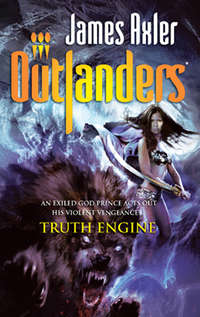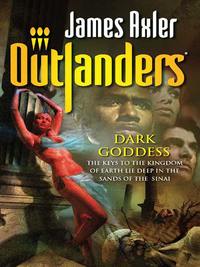
Полная версия
God War
His enemies were even now swarming at him from all sides, like a cloud of insects attacking an intruder. Naked, it was clear that each of them came from the same race as Enlil, their muscular lizard bodies moving with the same eerie grace that characterized the overlord’s gestures. They were adult Annunaki, full-grown yet they had only just come to life. The experiment engineered by Overlord Enlil had backfired terribly in the final moments thanks to the intervention of the Cerberus crew. The Annunaki had been grown in the vats of Tiamat, twisted around the DNA templates of trapped human bodies to create a new pantheon of Annunaki space gods. Even now, their egglike birthing pods stood silently around the scene of carnage, lining the sides of the vast room where streams of water burbled and catwalks grown from bone ran overhead.
Ill lit, the room was approximately the size of two football fields, with railless stairwells dotted around, each reaching up to the second level where the catwalks ran. To one side, a burning column belched smoke into the vast room, spewing out lightninglike shards of electricity toward the arched ceiling high above, illuminating the room in violent staccato bursts. Swathes of the roof were falling away in great chunks, crashing to the floor in explosions of dust and water.
And amid all of this, Enlil was struggling with the reborn forms of the Annunaki. There were 213 of them in all. Each one was unique, some male, some female, their scales a rainbow of achingly beautiful colors shimmering in the half-light that ebbed through the birthing chamber. Some had spines across their brows like Enlil’s, while others featured a crown of bony protrusions around their skulls.
Believing himself to be the last survivor of his race, Enlil had grown these bodies to re-create the glory of the Age of the Annunaki, who had ruled the Earth more than five thousand years before. Prior to Enlil’s experimentation, the rebirth of the Annunaki had involved a slow procedure of growing hybrid bodies that could accommodate the genetic changes needed to transform, chrysalis-like, into their Annunaki final form. Enlil had altered that, utilizing a much quicker—though far more traumatic—process to skip a step and change the basic human template into one suitable for the Annunaki. His plans had been interrupted by Grant, Domi, Rosalia and Kudo, and the waiting bodies had been awoken too soon, their memory downloads incomplete. In place of the memories of his brethren, Enlil found that an unexpected third party had been at play, prepped to snatch the bodies for their own. This group were the Igigi, the one-time slave caste of the Annunaki who were recorded in legend as “those who watch and see.” Without doubt, the Igigi had “watched and seen” the moment to finally strike against their one-time master.
According to Sumerian myth, there had been one thousand Igigi who served the Annunaki, and each one was considered to be a god by the human populace. However, their role had been to facilitate the day-to-day running of the Annunaki empire on Earth, and they had never achieved names. When Enlil had unleashed the Great Flood to cleanse the Earth of the human race, he had dismissed the Igigi, leaving them to drown as nothing more than collateral damage. But a group of rebellious Igigi had been wise to his plan and had hidden their memories in a shadow box until such time as they had bodies that could house them once more. When Enlil had generated this new army of Annunaki gods, the Igigi had seized their chance and now their souls occupied the Annunaki shells in place of the planned downloads. Now 213 fiercely powerful bodies had turned on the Annunaki overlord who had tried to extinguish them many millennia ago—213 angry souls.
Enlil had been knocked down to the floor by their vicious attacks, and more of the Igigi-possessed
Annunaki swarmed on him, kicking and punching him from all sides as he lay on his back. A mound of bodies pressed against him, crushing Enlil to the floor by the sheer weight of numbers. At the bottom of that mound, Enlil was struggling for breath as five or six strong Annunaki bodies crushed against his chest, clawed hands grasping for his throat, reaching for his eyes.
Then, with an almighty effort, Enlil flinched his body, sharp and sudden, and three of the monstrous forms were thrust away from him, careering into the canal streams that filtered across the room.
Enlil shoved upward with both hands, pushing two more of the figures away even as more attackers neared.
“Get away,” Enlil snarled, batting at a clawed foot as it swung at his face.
The kicker lost his balance, toppling back as Enlil twisted his grip. As he did so, another Annunaki drove a heel into Enlil’s flank, driving the breath from his lungs as he rolled across the hard floor.
Enlil sprawled on his face, his scarlet cloak in disarray about him. There was water here—a shallow channel that ran the length of the room. Four feet wide, it was used to transport items across the vast distance of the chamber. Enlil felt the water’s coolness lash against his face, reviving him instantaneously as the Annunaki figures stalked toward him, the sharp claws of their feet clacking against the bonelike tiling in a rising drumbeat of hate.
Enlil pushed himself up, assuming a crouching position. Lightning ripped across the ceiling of the chamber, echoing with such fury that he could feel its pressure drum across his chest. Behind him, a blast of that wild electricity slammed against a stack of the cylindrical birthing pods and they burst into flame. Enlil felt the heat against his back as he watched the milling crowd of reborn Annunaki. Every eye was on him, and every pair of eyes showed the unrestrained fury that welled within. He had betrayed these Igigi, these slaves, betrayed them without a thought, casting them aside as if they meant nothing. But he was a god. Was this not his right?
“Get back, damn you,” Enlil spit as the Igigi moved in on him. “I am your lord...your master...”
Enlil’s words trailed off as another of the furious Igigi leaped at him, swiping at his face with a salmon-scaled hand that ended in a phalanx of razor-sharp claws. Each of the Annunaki bodies was subtly different, each with its own attributes, its own natural weapons. Enlil rolled aside as the clawed hand reached for his face, only to find he had stepped out of the path of one attack and straight into another. This Annunaki was a broad-shouldered male with skin a canary yellow freckled with brown spots like rust. The yellow-skinned figure cuffed Enlil’s ear with a savage punch, the blow so hard it made the overlord’s head ring. Then the creatures were following up on their attack, the yellow one driving his knee viciously at Enlil’s gut while the red-scaled one got his arms around Enlil’s throat from behind and snapped him backward.
Enlil howled in agony as the knee struck his stomach. He was bent so far back by the one holding him that he couldn’t move with the blow, and so it seemed to rip through him in a paroxysm of straining muscles.
The yellow-hued creature came at Enlil again, drawing his arm back in readiness for a brutal punch to the face. Enlil watched that blow rushing at him, timing the attack in his mind before rolling his shoulders. Enlil’s move served to shift his weight just slightly, but it was enough that he dropped beneath the nasty blow, leaving it to strike at the attacker who still held him from behind by the throat. His captor, the red-scaled Annunaki male, fell down in a flurry of limbs, releasing Enlil as he did so.
Enlil fell, too, unable to keep his balance as he was drawn down by the creature that had held him. His left palm slapped against the tiled floor in a loud clap, and his bent knee brushed the surface of one of the water channels. Then he was up again, spinning back to his feet with the speed of thought.
“I am your master,” he repeated as more of the reanimated Annunaki crowded toward him. “You will bow down before me.”
Still close, the yellow-hued Annunaki pressed his attack on the traitorous overlord, lashing out with a high kick to Enlil’s jaw. The kick brushed against the
bottom of Enlil’s face, and he was driven up and back at the same time, plummeting down to the bonelike tiles once again in a swathe of billowing red cape.
The yellow Annunaki took a step toward him to renew his attack, but at that moment another lightning strike rocked the high rafters of the room and something large hurtled down from overhead, a boxy shadow in the darkness. It was a seven-foot-long section of one of the catwalks, its surface curved and bevelled, with no railings to prevent a user from stepping off. Now it tumbled through the air, crashing toward the floor beneath.
Enlil watched as the section of catwalk crashed down into the yellow figure’s back, slamming him hard across both shoulders and back of the head before he could even react. A shock wave reverberated through the room as the catwalk landed, chunks breaking away with the impact. The yellow figure dropped to the floor, moaning in agony as the catwalk pinned him in place. Blood leaked from the sides of his mouth as he tried to lift himself, but the section of catwalk was too heavy for one Annunaki to move.
Yet there was no time for Enlil to turn this momentary respite to his advantage. Already more of the Igigi creatures were swarming toward him in their stolen bodies, encircling him and cutting off any possible chance of escape. Not one of them spoke; they just stared at him through the slit eyes of the Annunaki, their hate burning in those putrid yellow depths.
Enlil pushed against the hard floor, struggling to stand. But he was too slow. Already another combatant, this one in a beautiful female Annunaki body covered in scales of cobalt blue, was lunging at him with deadly purpose. The Igigi drove both knees down into Enlil’s gut in a savage drop-blow before he could
clamber off the floor. Enlil slammed back to the tiles, his spine jarring with the bone-crunching impact. Without hesitation, Enlil’s arms snapped out and he grabbed his attacker by the throat, tightening his grip against the armorlike scale plate there.
“Look at me,” Enlil insisted, biting the words through clenched teeth. “I am your master.”
In response, the blue-scaled Annunaki hissed defiantly, spitting a glob of saliva into Enlil’s face. With a swift twist of his hands, Enlil snapped the creature’s neck, tossing her aside like so much worthless trash. They were not true Annunaki, Enlil sneered; killing them was easy. More than two hundred of the possessed bodies surrounded him, Enlil saw, and he struggled to his feet where a stream of water sparkled past him.
“I gave life unto you,” Enlil insisted, his tattered cloak swirling about him as he turned to face each of the slave class, piercing them with his indomitable gaze. “Tiamat is your mother, but I fathered you.”
He searched the crowd, eyes meeting and passing the glaring eyes of more than two hundred creatures who had spent millennia waiting for payback. Overhead, another great chunk of the ceiling peeled away like skin and crashed down, electricity playing across it like witchfire as it slammed to the plate floor behind the Annunaki forms.
“I am your master,” Enlil reminded them. “Without me, you are nothing, simply purposeless creatures.”
As one, the Igigi stepped toward Enlil, their minds working in unison, bringing their final, brutal judgment on this monster who had once ruled them. They were in uni-thought, the shared horror of spending over three thousand years without bodies creating a kind of melded mind, frayed and blurred, no longer able to differentiate between individuals.
Enlil’s shoulders shook as he struggled for breath, the exertions of this battle so soon after he had fought with Grant and his Cerberus colleagues draining his inner resources. Once again, lightning flashed overhead, lancing across the ceiling like a white-hot claw.
“I am Enlil,” the overlord stated. “Enlil the destroyer. The one known as Dagon, as Kumbari, as the Imperator. A hundred names for a million peoples, and every one of those peoples obeyed me.”
As one, the Igigi in their Annunaki shells took another menacing step toward Enlil, blocking him off on all sides, caging him in place.
Enlil glared at them, the power of his will lancing through his eyes like the hypnotic stare of the cobra. “You will obey me,” he told them, his voice firm despite his panting breath.
As one, the Igigi took another tentative step forward. And then, as one, they stopped.
Enlil turned to survey them, his gaze falling upon each in turn as more than two hundred lesser beings stood all around him, awaiting his orders once more. They had turned on him for a moment, three thousand years of torment twisting their minds, making them believe perhaps that they were his betters. But he was the overlord.
“Now,” Enlil breathed ominously, “we have work yet to do.”
Above, a triple flash of lightning hurtled across the ceiling of Tiamat’s birthing chamber, lancing down and destroying another clump of the birth pods that had been used to grow new bodies for the Annunaki. It didn’t matter. The Igigi would do.
Enlil had his army, eternally obedient. He was overlord for a reason.
* * *
GRANT’S TEAM rushed through the bone city of the dragon, the empty streets echoing with their footsteps. As they ran, Grant engaged his Commtact, a hidden radio transceiver that was used to communicate with his colleagues in the field and back at Cerberus headquarters. Most of the members of the Cerberus field teams had a surgically embedded Commtact. The subdermal device was a top-of-the-line communications unit, the designs for which had been discovered among the artifacts in Redoubt Yankee several years before by the Cerberus exiles. Commtacts operated via sensor circuitry, incorporating an analog-to-digital voice encoder that was subcutaneously embedded in each subject’s mastoid bone. Once the pintels made contact, transmissions were picked up by the wearer’s auditory canals, and dermal sensors transmitted the electronic signals directly through the skull casing, vibrating the ear canal. In theory, even a completely deaf user would still be able to hear, after a fashion, courtesy of the Commtact device. Commtacts also functioned as real-time translation devices, providing they had enough raw vocabulary from a language programmed into their processor, and because they were directly connected to the body of the user, could amplify speech no matter how quiet.
“Encrypt alpha-niner,” Grant murmured as he brought the Commtact to life, engaging the encryption protocols that had been added to the system over the past six weeks. “Cerberus, this is Grant.”
There was a pause while Grant waited for one of his faraway colleagues to respond. The voice that came back was that of Donald Bry, a man who was loosely considered the second in command of the Cerberus operation and whose voice, like his manner, seemed ever fraught with worry. “Go ahead, Grant.”
“Have just exited Tiamat,” Grant explained. “Making our way out of the ville now. Kishiro didn’t make it and we have wounded.”
“How many?” Bry asked over the Commtact, his voice emotionless and professional now.
“Kudo took a face full of explosive,” Grant explained, “and Domi’s out of it right now. I want her checked over as soon as she wakes up. She’s been through a shitload of trauma.”
Still running, Grant turned to Rosalia with a raised eyebrow. “Rosie? Anything you want to add?”
“I can look after myself,” the dark-haired mercenary said dismissively. “You worry about your people, Magistrate.”
Unlike Grant, Rosalia had only served with Cerberus briefly. She valued her independence, and there had been no time for her to have the minor surgery necessary to implant a Commtact receiver, even had she agreed to it. Grant eyeballed her a moment longer before relating her response back to Bry. Dark streaks of ash and soot marred her otherwise beautiful features, and her clothes were ripped in places, but otherwise she seemed fine.
“We lost our transport,” Grant continued, speaking into his Commtact, “so we’re going to need an exit strategy. You have anything showing, Donald?”
The Cerberus organization favored several specific methods for transporting their personnel over vast
distances. Although its staff frequently utilized air and ground vehicles, the operation itself had taken its name from a twentieth-century military project devoted to a teleportation system that relied on mat-trans units. More recently, Cerberus had applied that knowledge to the alien design of the interphaser, accessing parallax points to transport staff across the globe and beyond.
“Scanning for mat-trans locations now,” Bry assured Grant.
“Stay on it,” Grant acknowledged. “We’re maybe fifteen minutes from city limits yet.”
With that the communication broke off at Grant’s command.
* * *
SOMEWHERE ON THE West Coast of what had historically been known as the United States of America, Cerberus operator Donald Bry was flipping through computer screen data trying to find a suitable exit point for Grant and his team. Until recently, the Cerberus headquarters had been located in the Bitterroot Mountains of Montana. However, following the devastating attack by Ullikummis, the redoubt had been evacuated, and the core personnel had taken up temporary residence on the West Coast. For the moment, Cerberus was much diminished while it struggled to recover, many of its surviving staff forced into hiding.
Bry was a slender man with an unruly mop of copper curls and an expression that ranged from worried to fearful. He was a man given to stressing over a given situation, be it the health of his operatives or simply what the best filling would be for his lunchtime sandwich. He was, however, a remarkable computer expert whose dedication to his job made him an irreplaceable asset to the Cerberus organization.
Bry sat amid a bank of laptops, each wired through a mainframe to boost their power and link their attributes. Across the room, Brewster Philboyd worked at his own terminal, scanning information from several satellite feeds and location marker points. Tall with swept-back blond hair, Philboyd was an astrophysicist. He wore the standard white jumpsuit of Cerberus staff along with his usual black-framed spectacles.
As the two worked at their separate tasks, another call came over the Commtact system. This one was from a field operative called Kane, and it caused some excitement in the temporary Cerberus hideout. Kane had located the base of their enemy, Ullikummis, and Philboyd and Bry combined their resources to bring the location up on screen. As they did so, the founder of the Cerberus operation, Mohandas Lakesh Singh, joined them to review the situation and speak directly with Kane.
Thus, by the time Bry got back to the question that Grant had posed, a full twenty-two minutes had passed.
“It seems that the easiest way to evac your team is to use the interphaser,” Bry explained to Grant.
“We don’t have one with us,” was Grant’s patient response.
“I’ll send someone out to meet you, and you can all come home together,” Bry said, eminently logical.
“Makes sense,” Grant agreed. “Where do you need us?”
Bry tapped out a sequence of commands on his computer keyboard, bringing up a map of parallax points, which he combined with the location transponder that Grant had with him at all times. Hidden beneath his flesh, the transponder relayed his location as well as crucial data regarding his state of health. “I’m getting a parallax reading about twelve miles to your west,” Bry explained as he watched the map light up.
“That’s gonna be a trek,” Grant complained. “Nothing closer?”
“Wait,” Bry replied, speaking as much to himself as to the man on the other end of the communication link. Before Bry’s eyes, the on-screen map glowed with the crucial locations of the parallax points. They looked like a grid of stars, sprayed across Iran, Iraq and the rest of the Arab world. As Bry watched, a new point lit up on the map just outside the dragon-shaped settlement, less than a half mile from where Grant’s transponder was showing. It was as if a new parallax point had just come into existence. But, that wasn’t possible, was it?
“Grant, I’m picking up a point close to you....” Bry began warily. “It seems to have just appeared.”
* * *
ON THE OUTSKIRTS of the dragon-shaped structure on the banks of the Euphrates, Grant, Rosalia and Kudo were staring in amazement as a huge rift opened in the air before them. Twin cones of light ebbed up and downward, growing larger as they watched. The multicolored blur within those cones was tinged with darkness as if painted on a black canvas, streaks of lightninglike witchfire playing within its depths. The Cerberus field team watched, incredulous, as the rift expanded, those twin cones spreading up from a central point at ground level, like some incredible hourglass poised in the air. For a moment it simply stood there, uncanny colors swirling in its depths. And then, even as Grant’s team struggled to take in what they were looking at, the rift in space began to disgorge hundreds upon hundreds of people, each one walking in step from its impossible depths like some incredible army. Striding at the head of that army was the unique stone figure of Ullikummis, the magmalike veins trailing across his body with a fierce, red-gold glow. Grant recognized someone else, too, walking purposefully just beside the ancient stone god—it was the unmistakable figure of missing Cerberus operative Brigid Baptiste, her red-gold hair in sympathy with those glowing strands of lava that crisscrossed Ullikummis’s frame.
Distantly, Grant was aware of Bry’s words trailing off over the Commtact receiver and he engaged the microphone pickup. “Thanks for the heads-up, Donald,” he said. “We see it. And it ain’t pretty.”
Chapter 3
Some fifteen minutes earlier, the temporary Cerberus ops room had come to excited life as a communication was received from Kane. Accompanied by an old ally of the Cerberus team, Kane revealed that he had finally discovered the location of Bensalem, the fortress island that Ullikummis had designated his headquarters.
The Cerberus operation was connected to the external world via a web of communication and surveillance devices, the core of which was made up of two satellites in geosynchronous Earth orbit. Cerberus employed concealed uplinks that chattered continuously with these orbiting satellites to provide much of the empirical data its operatives relied upon. Gaining access to the satellites had taken many hours of intense trial-and-error work by the top scientists at the original Cerberus redoubt. Now the Cerberus crew could draw on live feeds from an orbiting Vela-class reconnaissance satellite and the Keyhole Comsat.
Speaking in real time to Kane, Brewster Philboyd accessed the reconnaissance satellite to track his position. Aged somewhere in his midforties, Brewster Philboyd was a long-serving Cerberus desk jockey. His lanky six-foot frame seemed hunched as he sat at the laptop and fed information to the satellite following Kane’s instruction. Philboyd had joined the Cerberus team along with a number of other Moon exiles about two years earlier, and had proved to be a valuable addition to the staff. His dogged determination to find the cause of a problem or uncover the basic workings of a system had helped reveal the operating secrets of the interphaser. While he wasn’t a fighter, Philboyd was as determined as a dog with a bone when he was faced with a scientific or engineering problem.
As Brewster worked, Donald Bry took over the communication feed, discussing the situation with Kane. As he spoke, Lakesh walked into the sunny back room that had been transformed into the operations center.
Lakesh was not a tall man, but he stood with a regal bearing. He had dusky skin, thick black hair with slight hints of white at the temples and above the ears, and a refined mouth beneath an aquiline nose. He looked to be a man of perhaps fifty years of age, but in fact Lakesh was far older. Having spent more than a century in cryogenic suspension, Lakesh was truthfully a man of 250 years of age, and until quite recently he had looked to be exactly that. A contrivance of circumstances had served to allow Lakesh to renegotiate his age, bringing him back to a healthy fifty-something after a period of accelerated decrepitude. A physicist and cybernetics authority, Lakesh had been present when the U.S. military had first begun testing the mat-trans system. Not given to panic, Lakesh provided leadership that formed a calm center around which the Cerberus operation rotated.









